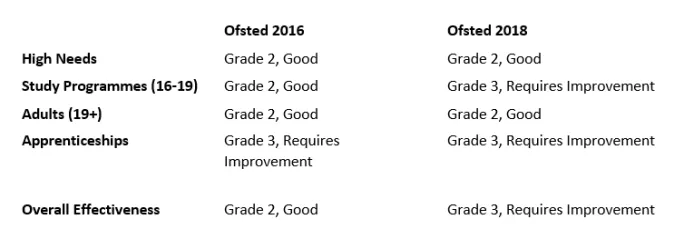- Home
- ‘Ofsted needs a new approach to college groups’
‘Ofsted needs a new approach to college groups’

NCG has just been inspected by Ofsted in the biggest inspection ever seen in further education.
The inspectorate sent around 35 of Her Majesty’s inspectors (HMIs), Ofsted inspectors and quality assurance professionals to inspect our six colleges, alongside Rathbone study programme provision, which together form NCG (it was actually hard to determine exactly how many inspectors were involved at one point). At the same time - in a technically separate inspection - more HMIs and Ofsted inspectors were sent in to inspect our private training subsidiary, Intraining.
As long ago as 2015, I began asking for a new inspection framework for FE and skills, which would provide a separate inspection grade for each constituent college in a group.
Devolved leadership model
There are two reasons for this. The first reason is ethical: a single grade across a group with colleges which clearly serve different communities has the real potential to provide misleading information to stakeholders - learners, parents and businesses - who deserve accurate information about their local education provision.
The second reason is more prosaic. College groups of any scale will not function well without a clearly devolved leadership model, which, in turn, requires clear transparency to stakeholders in each locality to ensure proper accountability both inside and outside the group.
Given the emergence of other college groups (something I welcome), the need for a change in the current approach is even more pressing.
Six colleges; one Ofsted grade
NCG currently comprises six colleges (five general FE colleges and a purpose-built sixth-form college) and NCG’s provision was judged as follows by Ofsted:

I’ve included the 2016 inspection results for comparison. For the avoidance of doubt, I have no problem with the validity of Ofsted’s judgements above; they mostly matched our own self-assessment grades for our provision in 2016-17.
However, I would like to unpick some of the evident flaws that the current inspection framework will inevitably cause for all college groups.
‘Major restructure’
As is clear from the table, it was the drop from “good” to “requires improvement” for 16-18 study programme provision that caused the overall aspect and, therefore, “overall effectiveness” grade for NCG to drop.
The fact that we haven’t improved our apprenticeship provision fast enough from grade 3 is certainly not being overlooked. However, when one unpicks 16-18 study programme provision, nearly 40 per cent of the volume is at Newcastle College and it was here that performance declined in 2016-17.
In 2016-17, in part due to a major restructure which saw 150 colleagues in Newcastle College take voluntary redundancy during the first few months of the academic year, outcomes in Newcastle College fell to 5.5 per cent points below the national rate, and were rightly self-assessed as “requires improvement”.
‘Sheer complexity’
Although predicted grades this year are now 3.1 percentage points above the national rate, Ofsted was not convinced that progress was sufficiently rapid and that these outcomes would be realised. As a result, Ofsted concluded that the entire provision in Newcastle College would be “requires improvement”. Except that the volume of study programme provision in Newcastle meant that, under the current framework, provision across all six colleges and Rathbone had to be assessed as grade 3.
In 2015 NCG proposed a project to the Education and Skills Funding Agency (ESFA) to collate performance data by college, which could then be published by the ESFA, going some way to meet our desire for transparency.
The sheer complexity of system changes required to do this - which would take pages in this paper to explain - meant there were a number of unintended consequences, hence the data for each NCG college wasn’t published in 2015-16, although some transitional data was published for 2016-17. These issues are now running “through the system” and the “real” position was explained and accepted by Ofsted. During our inspection, Ofsted was able to see this data and I’ve summarised it below:

(AR = Achievement Rate; RR = Retention Rate; Pred AR = Predicted Achievement Rate; SAR = Self-Assessment Report Grade)
‘One grade for everyone’
During our inspection, it would have been perfectly clear to Ofsted that, under any normal assessment of 16-18 study programmes, the data for Carlisle College, Kidderminster College, Lewisham Southwark College and West Lancashire College supported an assessment of “good”, just as the data for Newcastle College for 2016-17 supported an assessment of “requires improvement”.
However, the substantive point is that, given the volumes, a grade 3 for one college meant a grade 3 for everyone.
Ofsted made a valiant attempt to reference examples where provision was particularly strong (or weak) in particular colleges and Rathbone, much as it might reference subjects in a single college inspection. A similar issue arises on apprenticeship provision, which I’m clear now has to improve rapidly, although Carlisle perfectly meets any benchmark to be considered “good”.
The scale of the task
This isn’t a complaint. In fact, our inspection passed without much incident. Given the sheer scale of the task, on the Wednesday of the first week we invited Ofsted to take more time if it wished to do so and on the Thursday this was accepted and the inspection was completed the following Monday. This was perfectly amicable and helpful to all involved.
In my experience, Ofsted inspectors are, by and large, professional people doing a difficult and important job in often challenging circumstances. But the existing inspection framework brings into sharp relief the disservice to those communities for whom transparency should be their right and expectation. The Ofsted inspection framework needs to reflect changes in the FE sector and provide separate grades for colleges that are part of college groups.
I suspect that the move towards consolidation in FE will continue, with more and larger groups emerging. The need for Ofsted to adapt to this changing landscape is now more pressing than ever. The Department of Education has recently consulted on possible changes to the Ofsted inspection framework for 2019-20 onwards, so change may be coming. It is overdue.
Joe Docherty is the chief executive of NCG (formerly Newcastle College Group)
Keep reading for just £1 per month
You've reached your limit of free articles this month. Subscribe for £1 per month for three months and get:
- Unlimited access to all Tes magazine content
- Exclusive subscriber-only stories
- Award-winning email newsletters
